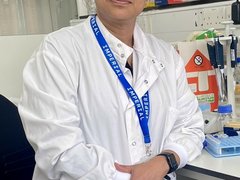Our research projects
Find out more about the research projects you're currently helping us to fund around the country.
22 results found.
Attacking the roots of AML
In some cases of AML, people can see their disease return. This is because some cells get left behind despite treatment. Professor Bertie Göttgens wants to understand more about this and find new ways to treat the disease.
Repurposing drugs to treat acute myeloid leukaemia
Blood Cancer UK's researchers look at whether existing drugs for solid tumours can treat AML. This could provide a new option for people with the disease.
Understanding changes in AML stem cells - Professor Constanze Bonifer
Find out more about Professor Constanze Bonifer's research into alterations in genes of Acute myeloid leukaemia (AML) cells, to find new ways to treat the blood cancer.
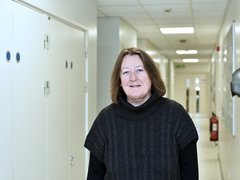
Understanding whether we can prevent acute myeloid leukaemia- Professor George Vassiliou
Find out more about Professor George Vassiliou's study into preventing people from developing acute myeloid leukaemia (AML), by seeing if DNMT3A is responsible for cells becoming ‘pre-leukaemic'.
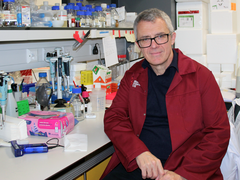
Finding new ways to treat AML - Professor Alex Tonks
Professor Tonks is studying what drives AML to try and find new treatment targets for people the disease.
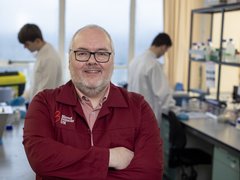
Understanding what causes relapse in people with AML - Professor Dominique Bonnet
In this project, Professor Bonet wants to understand more about the cell that she thinks is responsible for AML returning.
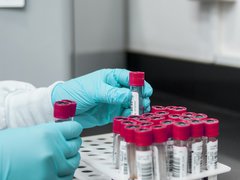
Finding new ways to treat acute myeloid leukaemia - Dr Neil Rodrigues
In this project, Dr Rodrigues is trying to find new ways to treat AML.
Understanding more about the alterations in our cells that can cause myelodysplastic syndromes (MDS) and acute myeloid leukaemia (AML)
Myelodysplastic syndromes (MDS) and acute myeloid leukaemia (AML) are both types of blood cancer that can occur when the process which repairs damaged blood cells goes wrong. Dr Quek wants to understand more about this to develop better treatments for people with these diseases.
Understanding how we could make better drug treatments to target acute myeloid leukaemia (AML)
Dr Payne wants to understand more about a specific alteration that causes acute myeloid leukaemia (AML), to help develop new, more effective drug treatments with fewer side effects.
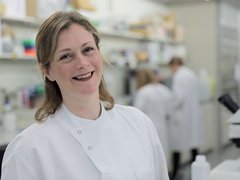
Creating new ways to prevent the development of myeloid blood cancers
Professor Vassiliou wants to understand how myeloid cancers develop before people start showing any symptoms to create new ways to prevent people developing these blood cancers.
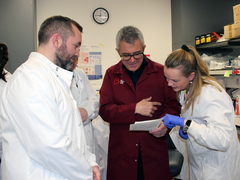
Unlocking a new, less harmful way of treating acute myeloid leukaemia (AML) - Professor Lacaud
Professor Lacaud's research is looking to understand more about the KAT6A protein and how it could be used as a kinder treatment for acute myeloid leukaemia (AML).
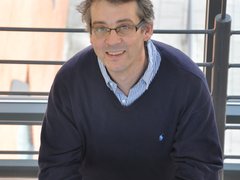
Targeting specific proteins in AML cancer - Dr Radzisheuskaya
Read more about how Dr Radzisheuskaya is seeking to understand the roles of specific proteins so she can develop more effective treatments for people with AML.
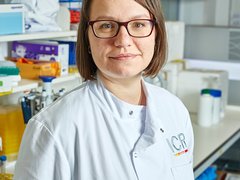
Identifying the tiny cells that causes AML to evade detection and survive
Read more about how Professor Tonks plans to investigate a new method that could help ensure all AML cancer cells are destroyed so the cancer is unable to come back.

Understanding how AML cancer cells deal with stress
Dr Papamichos and his team are researching to understand how AML cancer cells deal with stress so they can find ways to stop these cancer cells dividing and multiplying out of control.
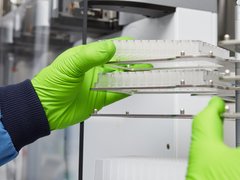
Revolutionising stem cell transplants to treat acute myeloid leukaemia (AML)
Professor Wynn is developing and testing a new type of stem cell transplant which he hopes could be a better treatment option for people with acute myeloid leukaemia (AML)
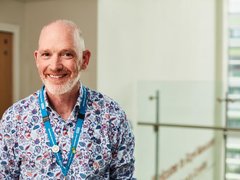
Using special cells in the bone marrow to help improve treatment of AML
Read more about how Dr Tissot and her team plan to study special cells in the bone marrow to help predict treatment outcomes and develop better treatments for people with AML.
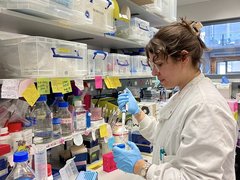
Unlocking new hope: developing new, effective treatments for people with myeloma and AML
Read more how Dr Luciano Nicosia is investigating a new drug to see if it might be a new way to treat myeloma and AML.
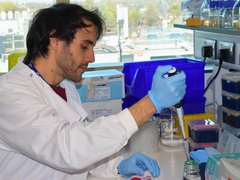
Understanding how leukaemia stem cells may help develop new treatments for AML
Read more about Dr Nisha Narayan who is exploring a new technique using leukaemia stem cells to predict how individuals with AML might respond to existing treatments.

Understanding how acute myeloid leukaemia (AML) can go undetected by the immune system
Dr Lappin wants to understand how cancer cells can avoid detection by the immune system so she can find ways to help it to better target the cancer cells.
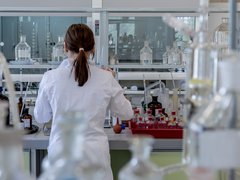
A new way of treating acute myeloid leukaemia (AML) in older people by reducing inflammation
Many people with acute myeloid leukaemia (AML) see their cancer come back. Dr Singh is studying a group of proteins to understand more about why drugs stop working.
